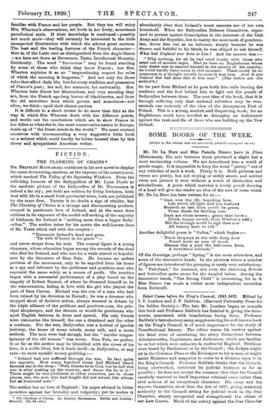FICTION.
THE CLANKING OF CHAINS *
Ma. BRINSLEY MACNAMARA continues in his new novel to display the same devastating candour, at the expense of his countrymen, which marked The Valley of the Squinting Windows. From the rollicking humour of the Ballygullion of Mr. Lynn Doyle to the sardonic picture of the Ballycullen of Mr. Macnamara is indeed a far cry; yet both are written by living Irishmen, both
deal with life in a small Irish provincial town, both are published by the same firm. Variety is no doubt a sign of vitality, but The Clanking of Chains is a strange and disconcerting product, steeped in passionate love of Ireland, and at the same time ruthless in its exposure of the sordid self-seeking of the majority of Irishmen, for Ireland is " nothing more than a bigger Bally- cullen." The author takes for his motto the well-known lines of Mr. Yeats which end with the couplet-
" Romantic Ireland's dead and gone, 'Tis with O'Leary in his grave "- and never strays from his text. The central figure is a young shopman, whose education began among the records of the dead who died for Ireland, and who was for a while stirred to hopeful- ness by the literature of Sinn Fein. He became an ardent
partisan of the movement, only to be expelled from his home as a spy and informer by the publicans and gombeen-men who espoused the cause solely as a means of profit. His troubles began with a successful performance of a play based on the tragedy of Robert Emmet, of whom he dreamed himself to be the reincarnation, falling in love with the girl who played the part of Sara Curran. Michael was the son of a man who had been ruined by his devotion to Parnell ; he was a dreamer who stopped short of decisive action, always worsted in debate by the triple alliance of the publican and gombeen-man, the prin- cipal shopkeeper, and the shon.een or would-be gentleman who aped English fashions in dress and speech. His only friends were visionaries like himself, the one a drunkard and the other a madman. For the rest, Ballycullen was a hotbed of ignoble jealousy, the home of mean minds, mean talk, and a mean outlook. The men were bad enough, but the " terrible tongue- tyranny of the old women " was worse. Sinn Fein, we gather, in so far as the author may be identified with the views of his hero, is a noble ideal, but it lends itself—in Ballycullen, at any rate—to mere squalid money-grubbing :-
" Ireland had not suffered through the war. In fact quite the opposite. How many hundred times had Michael heard farmers say in the shop Well, thanks be to God, but be hell this war is after making up the country, and damn the lie in it ! ' There might be war-profiteers in other countries, yet in those places, too, the men who had fought did not return like aliens, but as honoured men."
The author has no love of England : his pages abound in bitter invective against her brutality and vulgarity ; yet he makes it
• The Clanking of Chains. By Bewley Mucnsmara. Dublin and London : Mauusel. [8s. 8d. net.]
abundantly clear that Ireland's worst enemies are of her own household. When the Ballycullen Defence Committee, organ- ized to protest against Conscription in the interests of the Irish
Army and the Republic, but in reality the mere tools of gombeen- ism, drove him out as an informer, simply because he was sincere and faithful to his ideals, he was obliged to ask himself,
What had England ever done to him ? And his answer was :-
" Why nothing, for all he had cried loudly with those who cried out of ancient rages. Had he been an Englishman whose only desire was to expend himself in the service of his country, he could hardly have come to this moment. There could be no meanness in a thought merely because it was true. And it was Ireland that had done this to him now." (The italics are the author's.)
So we part from Michael as he goes forth into exile leaving the madman and the fool behind him to fight out the puzzle of Ballycullen between them. The root idea of the book, that it is through suffering only that national salvation may be won, reminds one curiously of the view of the Anonymous Poet of Poland. This is a strong, sombre, and disquieting book ; for no Englishman could have levelled so damaging an indictment against the rank-and-file of those who are building up the New Ireland.


































 Previous page
Previous page